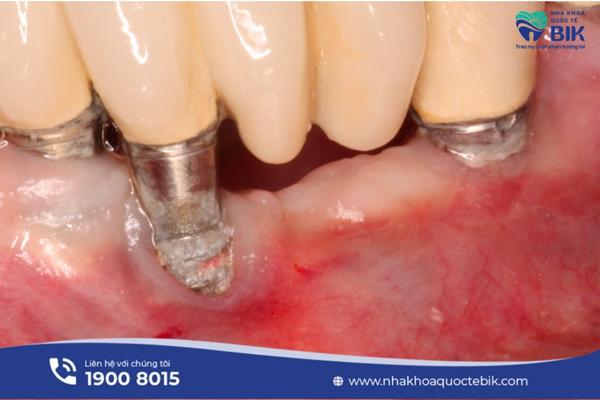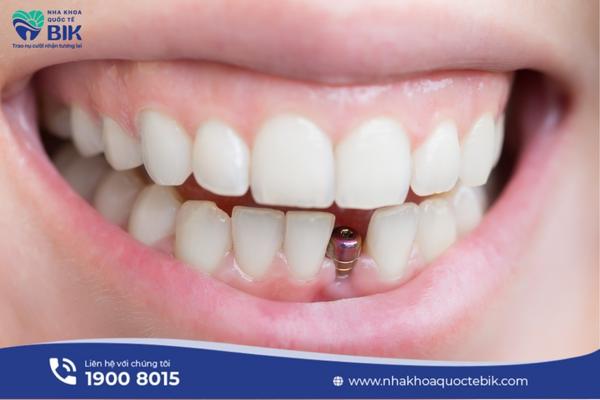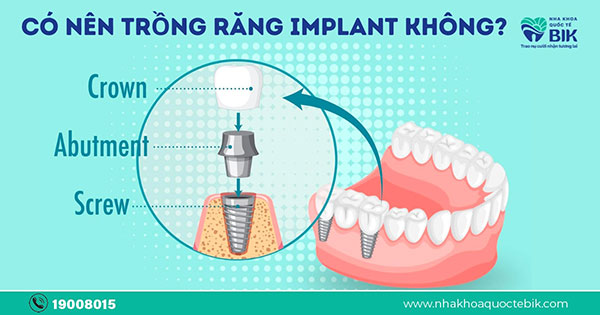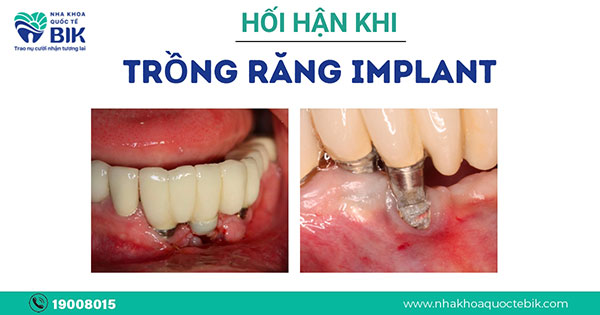
Currently, dental implants are chosen by many patients to overcome their tooth loss. With the high demand of customers who want to improve chewing function and smile more confidently after implanting teeth. However, on the market today, there are many poor quality implant lines of unknown origin, along with unreliable dental implant facilities, advertising cheap implant surgery causing many dangerous complications, making many people regret having implants.
1. Regret when planting poor quality dental implants.
Implants made of Titanium material have high biocompatibility in the oral cavity environment, are safe for health and are widely used in medicine. Therefore, the consequences of planting poor quality dental implants mainly come from the nature of the implant material that is not guaranteed.
Bleeding, swelling, inflammation, and even prolonged implant rejection after surgery are typical cases of failed implants. Not only does it affect your health and spirit, but it also wastes time, money, and other extremely dangerous consequences.
Reasons why you regret getting dental implants
– Irritation and infection in the implant area due to the implant material not being 100% pure titanium but mixed with other impurities such as lead, zinc, etc.
– Implants with substandard post designs, sizes that do not ensure the necessary length and width, causing the implant to loosen. This leads to easy breakage and stabbing into the opposite tooth when chewing, which can chip or break the tooth.
– Prolonged bleeding due to poor post surface treatment technology, inability to stimulate bone-forming cells, affecting the remaining bone. The next restoration requires additional bone grafting.
– Using poor quality implants, of unknown origin, not imported genuine. Any problems that occur after dental implantation will not be covered by the warranty.
2. Causes of failed dental implants
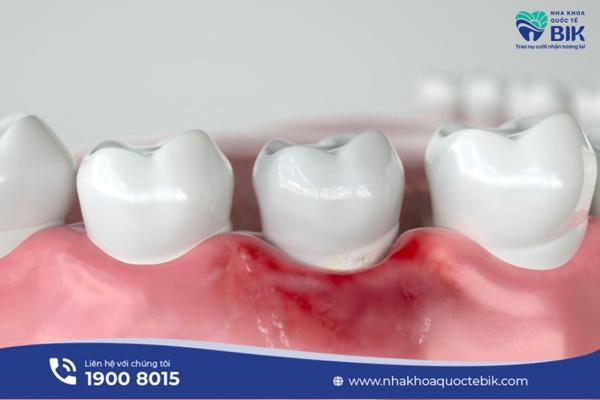
When choosing dental implants, patients want to overcome oral problems and have strong teeth for chewing. However, there are still unexpected cases that cause dental implants to fail, caused by the following main reasons:
– The jawbone does not meet the standards for implant placement: Long-term tooth loss leads to jawbone loss, not ensuring the quality for implant placement. When the jawbone is lost, the jawbone will gradually become thinner and not large enough to place an implant; not enough force to create stability for the implant and porcelain tooth when implanted.
– Placing the implant in the wrong position and direction as determined, causing the implant and the porcelain tooth above to be misaligned during the implantation. Placing the implant in the right position and direction is very important. If the doctor does not really understand the principles when performing this method and is not highly skilled, determining the direction of the implant will be incorrect.
– The process of performing dentures on implants is not done properly, causing the prosthetic teeth to become loose, leading to failure of the implant.
– The patient himself does not comply with oral care and protection. The patient has poor oral care habits, improper dental hygiene, causing food residue to remain between the teeth, creating plaque, which is a favorable environment for bacteria to grow, causing inflammation in the areas at the base of the implant.
– Patients who are addicted to smoking are at high risk of facing implant failure. Smoking is one of the contraindications of implant placement. Nicotine in cigarette smoke is an agent that causes wound infection, affecting the healing process.
3. Rejected dental implants
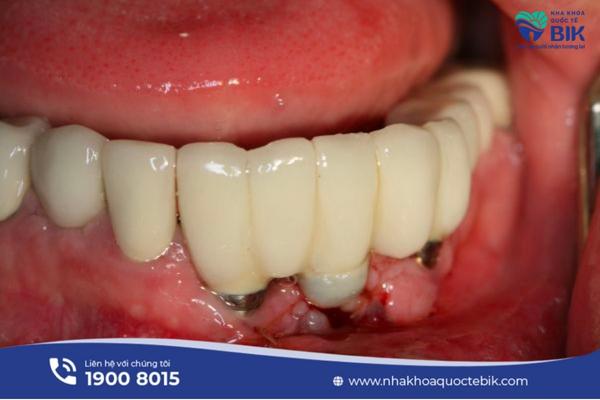
Rejected dental implants are one of the most dangerous consequences of poor quality dental implants. This case is assessed by a specialist as a failed dental implant.
3.1 What is a rejected dental implant?
Rejected dental implants are a condition in which there is no connection between the jawbone and the dental implant.
Rejected dental implants can occur in the following stages:
– During the healing process after implantation.
– During the restoration phase.
– After the end of treatment.
After implant placement, the patient will need about 3 months for the implant to integrate with the jawbone. However, if during this time the following signs appear, your implant is showing signs of rejection:
– The implant is loose: This condition occurs when the implant and the jawbone do not integrate with each other. This may be because the patient did not have the jawbone quality checked before treatment, so it was not enough to hold the implant or the implantation was performed incorrectly, etc.
– The implant protrudes and exposes the implant body: This is a clear sign of implant rejection. This may be due to substandard technique or improper wound care by the patient.
– Signs of swelling, pain, and inflammation: After implant placement, if you experience signs of swelling, pain, and inflammation at the implant site for up to 2 weeks, go to a dental implant facility for a check-up.
3.2 What to do when the implant is rejected

If the implant rejection is not detected early, it can lead to very dangerous long-term consequences for the patient.
When the implant is rejected, you will experience sharp pain or prolonged bleeding after surgery, the implant is loose. These phenomena need to be overcome early by:
– Stop bleeding at the implant site: Prolonged bleeding can cause other dangers. Use a clean cotton swab placed on the implant site, bite gently and hold the gauze. Contact the dentist and follow the dentist’s instructions.
– Do not use drugs on your own: Only take drugs as prescribed by your dental implant doctor. If any unusual problems occur, you should not take other drugs on your own because it will affect your body.
– Go to the dentist for an accurate examination: Certainly when the implant is rejected, as soon as you feel any abnormalities appear, you should quickly go to the clinic for a doctor to examine and check, to help determine the cause and have the most effective solution.
4. Poor quality dental implants cause bad breath

Some patients regret having bad breath after having poor quality dental implants, which more or less causes embarrassment and limits communication.
In fact, dental implants do not cause bad breath, but the leading cause of this condition is poor quality implants. If the implant and porcelain tooth materials are not of good quality, especially when the patient is allergic to the implant materials, the bad breath will be worse.
In addition, if you are having other dental problems or improper dental hygiene, it will also contribute to your bad breath.
Therefore, to limit bad breath, before implanting teeth, you should have a general check-up of your oral health and choose a reputable dental clinic for dental implants. When the implant is of guaranteed quality and is performed safely, it will not cause health problems.
5. Notes to prevent complications when implanting teeth
Dental implant is a difficult technique, this method will perform surgery to place an artificial Titanium pillar into the jawbone to replace the lost tooth root, so to achieve high efficiency and safety for health, it is necessary to pay attention to care to prevent possible complications.
– Follow the doctor’s instructions, take medication as prescribed.
– Practice proper hygiene and dental care
– Reasonable diet and rest.
– Especially do not smoke and use other stimulants
– Choose a reputable dental clinic for dental implants, this helps ensure the quality of the implant implanted in the oral cavity, as well as when unwanted complications occur, you will be quickly handled.
Although dental implant is an advanced technique that brings chewing efficiency and aesthetics to people with missing teeth, to avoid regret when having poor quality implants, you should carefully research reputable dental facilities to perform the procedure. Implants need to ensure safe materials along with the doctor’s expertise to avoid dangerous complications that are harmful to health.

